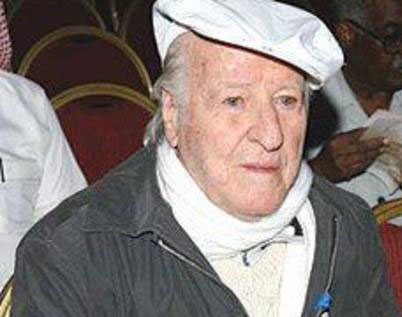Syrian people bade farewell today to great Syrian poet Suleiman al-Essa who passed away last Friday aged 92 leaving behind rich literary legacy for forthcoming generations.
Al-Essa’s poetry revolved around three main axes: childhood, national and pan-Arab topics and humanitarian themes. Throughout his great poems for children, the late poet tried to bring up a generation that believes in the sublime values of the Arab nation. He considered childhood as the last refuge for the aspirations of the Arab people. One salient feature of al-Essa’s children’s poetry was simplicity as the poet was keen on avoiding didactic style and passing his themes smoothly and indirectly to children.
The second axis of al-Essa’s poetry was the national and pan-Arab causes. The late poet had dedicated a large part of his work to national and pan-Arab topics. He wrote poems highlighting the importance of martyrdom for the sake of the people and homeland. His nationalist poems contributed to the demonstrations and the national struggle of his fellow citizens of Iskenderun.
Palestine question and the Arab people’s struggle to liberate their occupied lands had the lion’s share of the late al-Essa’s national poetry. Poet Saleh al-Hawari said that al-Essa’s death is a grave loss for the Arab nation, pointing out that he glorified the genuine Arab values and dedicated many of his poems to highlight the importance of the pan-Arab unity. He was arrested many times for his political poems and attitudes against the French occupation. He was also one of the founders of the Ba’ath Arab Socialist Party while still a student.
 The third axis of al-Essa’s poetry was the humanitarian content. In this regard, we should refer that his first collection of poetry described the misery and suffering of the peasants in his village as a result of the feudal system that was prevailing in the country at the beginning of the 20th century.
The third axis of al-Essa’s poetry was the humanitarian content. In this regard, we should refer that his first collection of poetry described the misery and suffering of the peasants in his village as a result of the feudal system that was prevailing in the country at the beginning of the 20th century.
The late poet was born in 1921 in the village of Noayriyeh near the city of Antakya in Liwa Iskenderun. He received his primary education in his village and later in Antakya and continued his education in secondary schools at Hama and Damascus after the annexation of Iskenderun to Turkey following a conspiracy concocted by Turkey and France by the end of the 1930s. He attended a teacher training college in Baghdad on a scholarship, and after his return home, he was appointed a teacher at Damascus schools and later first instructor of Arabic language at the Ministry of Education.
Apart from his great poetic creativity and contribution to the development of Arabic poetry, al-Essa’s mastery of French and English languages enabled him to translate important books and literary masterpieces into Arabic. He cooperated with his wife Dr. Malakeh Abyad in translating of many literary books, mainly Algerian books written in French.
In appreciation of his great literary contributions, al-Essa was granted prestigious literary awards at the local, Arab and international levels including the Afro-Asian Writers’ Union Lotus Prize for poetry in 1982, the Babatin Prize for poetic creativity in 2000 and the Syrian Order of Merit-Excellent Degree in 2005.
K.Q.

